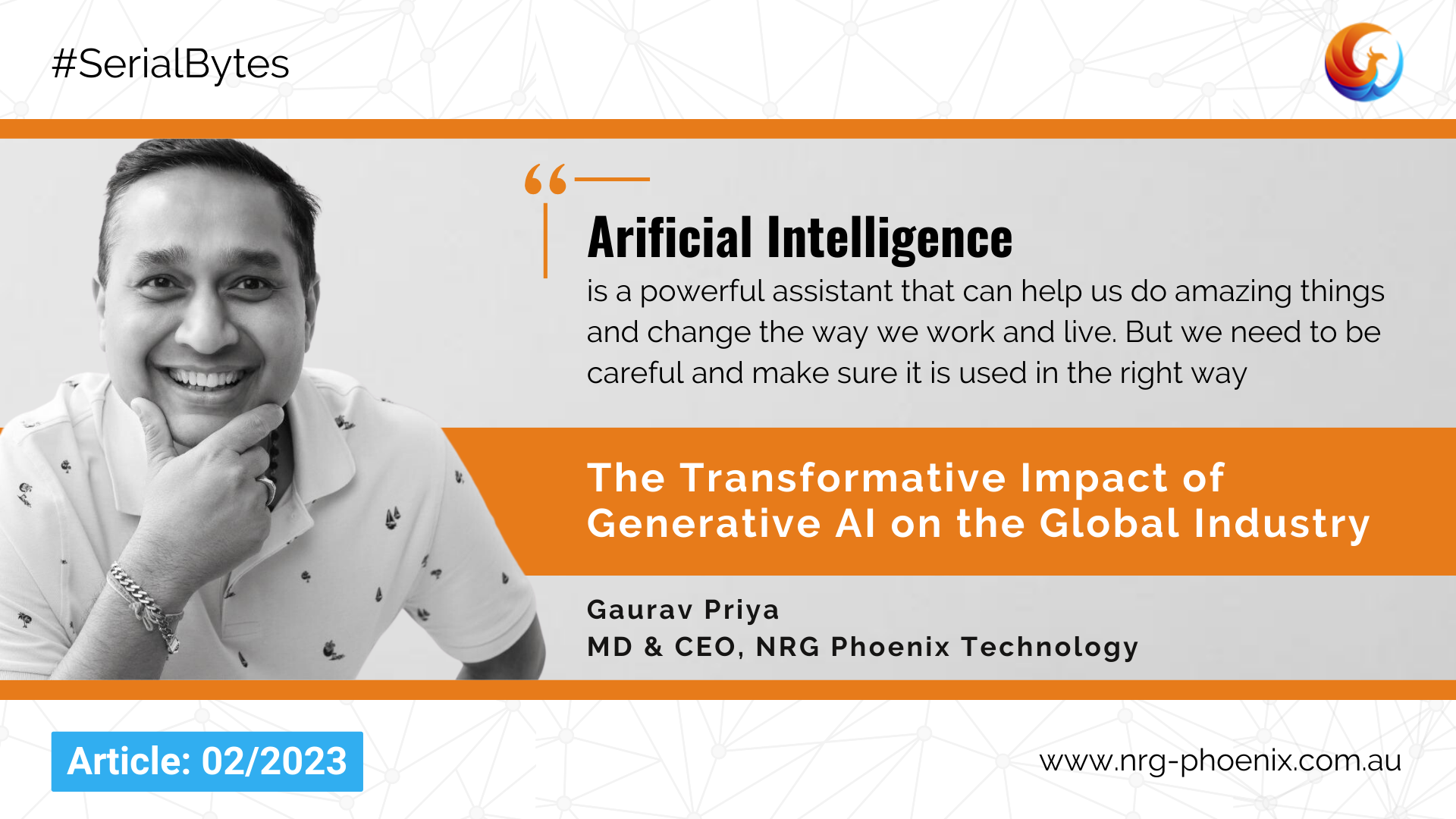Generative AI: The Transformative Impact of Generative AI on the Global Industry
Generative AI, a groundbreaking force in our technological landscape, is orchestrating a profound transformation across diverse industries, propelling us into an era of unprecedented innovation and creativity. This dynamic technology, driven by powerful algorithms and immense computational capabilities, possesses the remarkable ability to unlock creativity and generate content that spans art, music, prose, and even complex scientific data.
The Power of Generative AI
Imagine a world where AI models understand patterns and generate entirely new data, resembling the training set they have been fed. This is the magic of Generative AI—a fusion of neural networks and deep learning that creates original, meaningful content. The applications are as vast as our imagination—creating art, developing conversational agents, and aiding scientific research.
Take ChatGPT, for example—a marvel developed by OpenAI. Trained on vast troves of text data, this AI model can generate responses, articles, code, poetry, and more, often indistinguishable from human-created content.
Generative AI Redefining Creativity and Efficiency
In the world of creativity and efficiency, Generative AI has turned the tables in the IT sector. By harnessing deep learning and utilising extensive datasets, AI models like ChatGPT now produce content that is remarkably human-like. Today, over 61.5% of companies have eagerly embraced Generative AI into their workflows [1].
Content Creation at Scale
Generative AI is revolutionising content creation, impacting content marketing strategies dramatically. It empowers businesses to churn out a plethora of content—be it blog posts or social media updates—at a scale and speed than ever. In fact, 52% of business leaders have already implemented Generative AI tools for content creation, and this is expected to soar to 64.7% by the end of 2023 [2].
Enhanced Educational Support
Education is witnessing a transformation. Generative AI is becoming an invaluable aid for students in their learning journeys. Models like ChatGPT simplify the process, making it easier for students to seek explanations, answers to questions, and assistance with their assignments. Surprisingly, 1 in 3 US college students is now utilising Generative AI for their academic tasks, with a staggering 60% of them relying on it for more than half of all assignments [3].
Driving Market Growth
The impact of Generative AI extends beyond creativity—it is a driving force for substantial economic growth. The Generative AI market is on a trajectory of staggering escalation, potentially reaching a mind-boggling $1.3 trillion by 2032. The market is already valued at approximately $40 billion, underscoring its immense growth potential [4].
Generative AI in Software Development
In the realm of software development, Generative AI shines as a remarkable application. It is increasingly being employed to generate code, significantly speeding up the development process. Code generators, a subtype of Generative AI tools, are projected to experience a whopping compound annual growth rate of 72.9% over the next five years [5].
Impact on Productivity
But Generative AI is not just about creating content—it is about enhancing productivity by automating repetitive tasks, liberating human resources to focus on more strategic and value-driven activities. Studies indicate that Generative AI has the potential to reduce the average worker's workload by a remarkable 60-70%, essentially translating to 40% of saved working hours [6].
In this rapidly evolving landscape, Generative AI promises an era of automation, creativity, and efficiency. Its potential to influence diverse sectors, including healthcare, finance, marketing, and more, is boundless. Generative AI is projected to contribute between $2.6 trillion to $4.4 trillion annually to the global economy, showcasing the immense value it can bring to industries [6]. Embracing Generative AI is not just a choice—it is a necessity to thrive and innovate.
At NRG Phoenix Technology Pty, we are thrilled to be part of this transformative journey, continually integrating cutting-edge technologies to drive progress.
References:
- [1]. [AI Business Trend Report] (https://www.jasper.ai/the-prompt/ai-business-trend-report)
- [2]. [AI Writing Statistics] (https://www.siegemedia.com/strategy/ai-writing-statistics)
- [3]. [ChatGPT Usage Among College Students](https://www.intelligent.com/nearly-1-in-3-college-students-have-used-chatgpt-on-written-assignments/)
- [4]. [Generative AI Market Projection] (https://www.bloomberg.com/company/press/generative-ai-to-become-a-1-3-trillion-market-by-2032-research-finds/)
- [5]. [Generative AI in Software Market Forecast] (https://press.spglobal.com/2023-06-08-Generative-AI-Software-Market-Forecast-to-Expand-Near-10-Times-by-2028-to-36-Billion,-S-P-Global-Market-Intelligence-Says)
- [6]. [Economic Potential of Generative AI] (https://www.mckinsey.com/capabilities/mckinsey-digital/our-insights/the-economic-potential-of-generative-ai-the-next-productivity-frontier#introduction)
